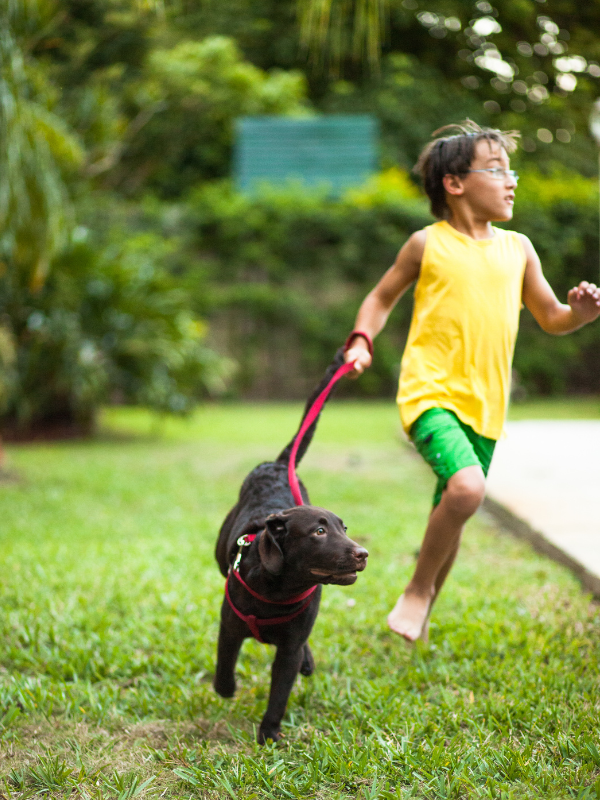737-215-3211

Puppy Exercise: How Much is Too Much?
As a new puppy owner, you may find yourself wondering about the right amount of exercise your furry friend needs. While exercise is vital for a puppy's physical and mental well-being, it's crucial to strike a balance to ensure they don't get overwhelmed. In this article, we will explore the topic of puppy exercise and discuss how much is too much. So, let's dive in and learn how to keep your puppy happy, healthy, and active!
Introduction
Welcoming a puppy into your home is an exciting and joyous experience. These bundles of energy require ample exercise to grow and develop properly. However, understanding the appropriate amount of exercise for your puppy can be challenging. Puppies have unique exercise needs that differ from adult dogs, and it's essential to tailor their exercise routines accordingly.
Importance of Puppy Exercise
Regular exercise for puppies is vital for their physical and mental health. Exercise helps strengthen their muscles and bones, aids in maintaining a healthy weight, and supports proper growth and development. Additionally, exercise is an excellent outlet for their abundant energy, preventing behavioral issues that can arise from boredom and pent-up energy.
Understanding the Growth Stages
Puppies go through several growth stages, and each stage has different exercise requirements. It's crucial to be aware of these stages to ensure you provide appropriate exercise at each phase of their development. The growth stages typically include the neonatal stage, transitional stage, socialization stage, juvenile stage, and adolescence stage.
Factors to Consider for Appropriate Exercise
When determining the right amount of exercise for your puppy, there are several factors to consider. These factors include breed characteristics, age, overall health, and any existing medical conditions. Understanding your puppy's unique needs will help you tailor their exercise routine accordingly.
Recommended Exercise Guidelines
While the exact exercise requirements can vary based on individual factors, there are some general guidelines to follow. Experts generally recommend 5 minutes of exercise per month of age, up to twice a day. For example, a 3-month-old puppy would benefit from 15 minutes of exercise twice a day. It's important to remember that these guidelines are just a starting point, and you should adjust them based on your puppy's energy levels and behavior.
Types of Exercises for Puppies
Puppies can engage in various types of exercises that cater to their needs and abilities. Some suitable exercises include short walks, playtime with interactive toys, controlled indoor games, and gentle training sessions. It's essential to choose exercises that are low-impact and appropriate for your puppy's age and size.
The Role of Mental Stimulation
Exercise isn't solely about physical activity; mental stimulation is equally important for a puppy's well-being. Incorporating activities that challenge their mind, such as puzzle toys, obedience training, and scent games, can keep them engaged and prevent boredom. Mental stimulation exercises also contribute to the overall development of their cognitive abilities.
Signs of Overexercising
While exercise is beneficial, overexercising can lead to fatigue, stress, and potential injuries in puppies. It's crucial to be aware of the signs that indicate your puppy may be getting too much exercise. Signs of overexercising include excessive panting, lagging behind during walks, reluctance to play, sore muscles, and difficulty settling down or sleeping.
Potential Risks of Overexercising
Overexercising a puppy can have adverse effects on their growth and development. It can put unnecessary strain on their developing bones, joints, and muscles, potentially leading to skeletal issues and long-term health problems. Therefore, it's essential to avoid excessive exercise and provide adequate rest for their bodies to recover.
Adapting Exercise as the Puppy Grows
As your puppy grows, their exercise needs will change. It's crucial to adapt their exercise routine to accommodate their increasing energy levels and physical capabilities. Gradually increase the duration and intensity of their exercises to keep up with their development. Consulting with your veterinarian can provide valuable guidance during this transitional phase.
Exercise Tips for Different Breeds
Different dog breeds have varying exercise requirements based on their size, energy levels, and inherent traits. High-energy breeds, such as Border Collies or Retrievers, may need more exercise compared to smaller or less active breeds. Researching breed-specific exercise recommendations and consulting with breeders or veterinarians can help ensure you meet your puppy's specific exercise needs.
Balancing Exercise and Rest
While exercise is crucial, it's equally important to provide your puppy with enough rest and downtime. Puppies, like human babies, need plenty of sleep for proper growth and development. Overstimulation and lack of rest can lead to behavioral issues and health problems. Make sure to create a balanced routine that includes both exercise and sufficient rest periods.
Creating a Safe Exercise Environment
When exercising your puppy, it's essential to create a safe environment to prevent accidents or injuries. Ensure that your backyard is secure, free from potential hazards, and that any equipment used, such as leashes or toys, are in good condition. Keep an eye out for extreme weather conditions that can pose risks to your puppy's well-being.
Training and Bonding through Exercise
Exercise provides an excellent opportunity to bond with your puppy and reinforce their training. Incorporating training exercises during playtime can help establish a strong bond while teaching them essential commands and behaviors. Use positive reinforcement techniques, such as treats and praise, to reward their good behavior and encourage them to engage in the exercise routine enthusiastically.
Consulting a Veterinarian
When in doubt about your puppy's exercise needs or if you have any concerns about their health, it's always best to consult with a veterinarian. They can provide personalized advice based on your puppy's specific requirements, monitor their growth and development, and address any potential issues or concerns.
Finding the right balance of exercise for your puppy is crucial for their overall well-being. By understanding their growth stages, considering their individual needs, and following recommended exercise guidelines, you can ensure that your puppy stays healthy, happy, and active. Remember to provide mental stimulation, watch for signs of overexercising, and create a safe environment for their exercise routines. With proper care, your puppy will grow into a healthy adult dog, full of vitality and joy.
FAQs
How much exercise does a 4-month-old puppy need?
At 4 months of age, a puppy should ideally have around 20 minutes of exercise twice a day. However, it's essential to monitor their energy levels and behavior to determine if adjustments are necessary.
Can I take my puppy for a run?
While exercise is essential, intense running or jogging is not recommended for young puppies. Their growing bones and joints are not fully developed, and excessive impact can lead to problems. Stick to low-impact activities until they are older.
What are some mental stimulation exercises for puppies?
Puzzle toys, treat-dispensing toys, obedience training, and interactive games like hide-and-seek or scent work can provide mental stimulation for puppies.
How do I know if my puppy is getting enough exercise?
A well-exercised puppy should have a balanced energy level, show contentment after exercise, and display appropriate behavior indoors. They should not exhibit excessive restlessness or hyperactivity.
Can I exercise my puppy after meals?
It's generally recommended to wait for at least an hour after meals before engaging in exercise. This helps prevent digestive issues and potential bloating.




Leave a comment